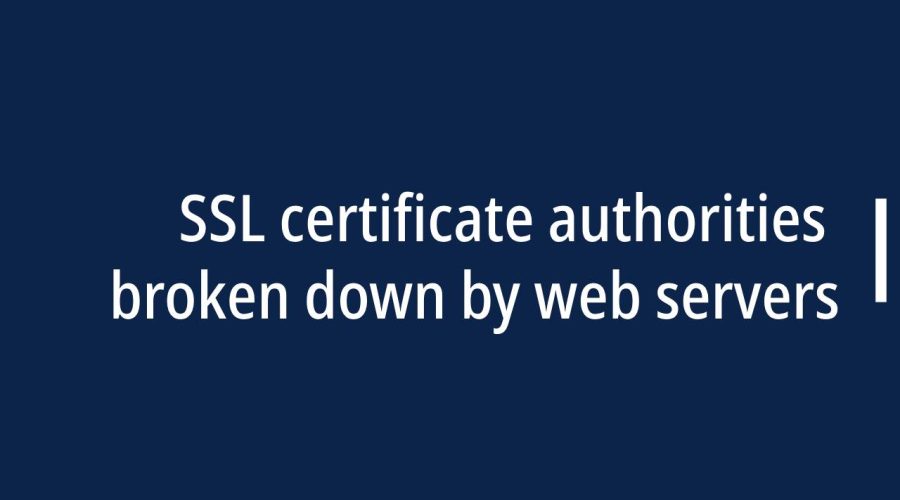When it comes to securing web servers and the data transmitted between them and clients, SSL (Secure Sockets Layer) certificates are essential. SSL certificates are issued by Certificate Authorities (CAs) and are used to establish secure, encrypted connections. The choice of SSL certificate authority can vary based on the web server software being used. In this breakdown, we’ll explore the usage of SSL certificate authorities across different web server software:
-
Apache HTTP Server:
Apache is one of the most widely used web server software in the world. It is highly versatile and supports various SSL certificate authorities, including:
- Let’s Encrypt: Known for its free SSL certificates, Let’s Encrypt is a popular choice for Apache users.
- DigiCert: A reputable CA offering various SSL certificate types.
- Sectigo (formerly Comodo): Provides SSL certificates with different validation levels.
- GlobalSign: A trusted CA with a strong global presence.
-
Nginx:
Nginx is another popular web server known for its performance and scalability. The usage of SSL certificate authorities with Nginx includes:
- Let’s Encrypt: Often used for its ease of integration and free certificates.
- DigiCert: Provides SSL certificates that are compatible with Nginx.
- Sectigo: Trusted for its SSL solutions, including wildcard certificates.
- GlobalSign: A reliable choice for securing Nginx web servers.
-
Microsoft Internet Information Services (IIS):
IIS is a web server software developed by Microsoft for Windows servers. SSL certificates for IIS often come from:
- DigiCert: Offers SSL certificates compatible with IIS and provides strong support.
- GlobalSign: Trusted for securing Windows-based web servers.
- Sectigo: Known for its compatibility with IIS and a variety of certificate options.
- GoDaddy: Offers SSL certificates suitable for IIS deployments.
-
Lighttpd:
Lighttpd is a lightweight web server known for its speed and efficiency. SSL certificates can be obtained from various CAs, including:
- Let’s Encrypt: Often used for its simplicity and free SSL certificates.
- DigiCert: Provides SSL solutions suitable for Lighttpd.
- Sectigo: Known for its compatibility with various web server software.
- GlobalSign: Trusted for its SSL certificates with strong security features.
-
Caddy:
Caddy is a web server designed for ease of use and automatic HTTPS. It simplifies SSL certificate management with the inclusion of Let’s Encrypt by default.
-
Tomcat (Apache Tomcat):
Tomcat is a popular choice for Java-based web applications. SSL certificates for Tomcat can be obtained from various CAs:
- DigiCert: Offers SSL certificates compatible with Tomcat.
- GlobalSign: Trusted for securing Java-based web applications.
- Sectigo: Known for its compatibility with Tomcat and Java applications.
- Let’s Encrypt: Can be used with Tomcat via manual configuration.
-
OpenLiteSpeed:
OpenLiteSpeed is a lightweight and open-source web server. It supports various CAs for SSL certificates, including Let’s Encrypt, DigiCert, Sectigo, and GlobalSign.
-
IBM HTTP Server:
IBM HTTP Server, based on Apache, can be secured with SSL certificates from CAs like DigiCert, GlobalSign, Sectigo, and Let’s Encrypt.
-
LiteSpeed Web Server:
LiteSpeed Web Server supports SSL certificates from multiple CAs, including Let’s Encrypt, DigiCert, Sectigo, and GlobalSign.
-
Netscape Enterprise Server:
Netscape Enterprise Server, though less commonly used today, supports SSL certificates from various CAs, including DigiCert, GlobalSign, Sectigo, and Let’s Encrypt.
It’s important to choose the right SSL certificate authority based on your web server software’s compatibility and your specific needs, whether it’s for a personal website, business, or e-commerce site. Additionally, consider factors like certificate validation level, support, and trustworthiness when making your choice. Your SSL certificate authority can significantly impact the security and trustworthiness of your website or web application.

Gloria Bradford is a renowned expert in the field of encryption, widely recognized for her pioneering work in safeguarding digital information and communication. With a career spanning over two decades, she has played a pivotal role in shaping the landscape of cybersecurity and data protection.
Throughout her illustrious career, Gloria has occupied key roles in both private industry and government agencies. Her expertise has been instrumental in developing state-of-the-art encryption and code signing technologies that have fortified digital fortresses against the relentless tide of cyber threats.
